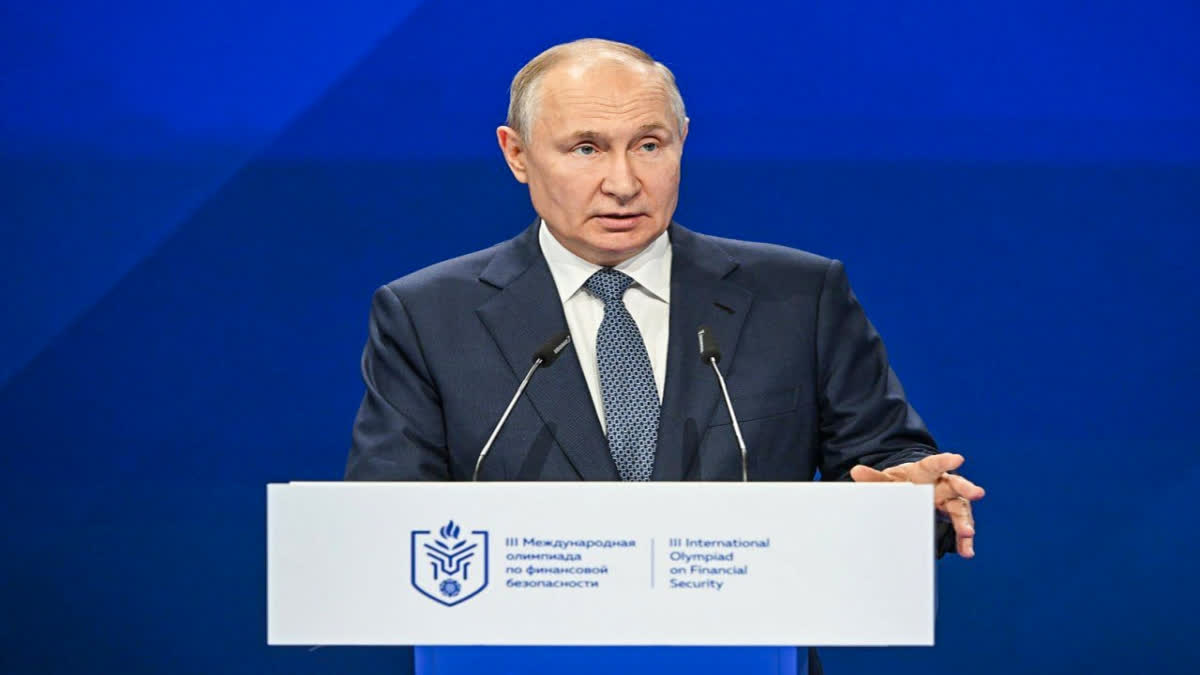Russian President Vladimir Putin's visit to China, the 'No-limit' friend, has certainly raised some eyebrows in the power centres of the Western world. Expectedly, Jim Kirby, the National Security Advisor (NSA) in the White House has doubted the recent bonhomie between the two neighbours and predicted that their newly acquired friendship will not last long as "Russia and China, both don't have a long history trusting each other".
Putin's state visit to China, which ended on May 16, was to celebrate 75 years of diplomatic ties between the two neighbours. Talking to the media on that day at the Russia-China Expo in Harbin, Heilongjiang province, Putin termed his discussions with his Chinese counterpart Xi Jin Ping as substantive and expressed satisfaction over the growing bilateral trade.
It is to be noted that the trade has gone up by 26.3 per cent to US$240 billion in 2023 and it is substantially in favour of Russia which supplies almost half of the crude needed by China. Russia is a huge producer of crude but has only a few takers due to the severe sanctions imposed by the West and the disruption of the supply lines. The two biggest importers of Russian crude are China and India whose purchase of crude almost offsets the cost of Russian operation in Ukraine.
Speaking in Harbin, Putin tried to convince the world that the partnership between Russia and China is aimed at "creating better conditions for the development of our countries and improving the well-being of the people of China and Russia". In a veiled attack on the Western world, the visiting dignitary claimed that "the emerging multi-polar world is taking shape before our eyes and those who are trying to maintain their monopoly on decision making in the world on all issues….do everything in their power to ensure that this process goes on".
At the end of the talks, a Joint Statement spanned in fourteen paragraphs was signed by the two leaders on deepening the "Comprehensive Strategic Partnership of Cooperation for the New Era". This tries to clarify that the Sino-Russian bilateral relations "has the nature of no alliance, no confrontation and not targeting any third party" though many third parties are mentioned in the latter paragraphs.
On one hand, the statement claims that different countries have the right to choose their own different paths owing to their different histories, cultures and national conditions and that "there is no such thing like a superior democracy" (taking a clear jib to the USA), on the other hand, Russia recognises, obviously in order to please China, Taiwan as an inalienable part of Chinese territory and opposes any form of "Taiwan independence". Building closer partnerships for energy, jointly safeguarding international energy security (to ensure uninterrupted supply to China and to avoid Nord Stream Pipeline for which impartial investigation was also called for), and urging NATO to abide by its commitment are other prominent features of the statement.
It expressed "serious concerns" on many issues like on "biological military activities of the USA" (perhaps an attempt to counter the charges levelled against China for deliberately spreading COVID), NATO's eastward expansion (to retain the Russian perspective also), AUKUS (a threat to both), Japan's plan to discharge the nuclear-contaminated water in its sea and requested the USA to respond to the 'legitimate and reasonable concerns' of the North Korea. Thus, the statement criticises all the adversaries of the signatories. However, the statement was surprisingly mum on QUAD. Though it mentioned, the US, NATO, Japan, DPRK, UK, and Australia (in AUKUS), mention of India was carefully avoided.
Now, what does it mean to India? Does it mean that in case of the border tension between India and China transforming into a full-fledged war, whose side will Russia take-India or China? Some analysts are trying to create an impression that India should be worried by the growing Sino-Russian friendship as, in such a scenario, Russia will most probably side with China or will remain neutral or worse, non-committal.
However, their faulty inferences are based on two assumptions- that there is a great possibility of war between the tiger and the dragon and secondly that Russia will immediately terminate its relations thus abandoning its interest with India - geostrategic, commercial and defence.
Firstly, there is no threat of aggression, immediate or in a predictable future, from China. China, currently deeply involved in the tensions in the South China Sea and struggling with the domestic economic accountability issues besides the worries about the dismal performance of BRO in general and CPEC in particular, will not think of opening a front with India especially when other big powers are involved elsewhere. It will not be possible for China to repeat 1962 as India is much better prepared for such an eventuality and unlike in 1962, the Western powers will come to our side.
However, even if the tension between India and China escalates to an unstoppable point, Russia has big stakes in India. India has been a significant buyer of Russian arms and even now, around 47 per cent of India's defence needs are catered by Russia by way of new acquisitions or spares.
We had acquired one S-400 anti-missile system from Russia without attracting US-imposed sanctions. Russia earns a good chunk of its export revenue from the supply of crude to India which is a win-win situation for both. Moreover, in Asia, Russia needs the largest democracy in the world to contain the expansion of the influence of the USA.
Thus, Russia needs India as much as, if not more than, India needs Russia. Perhaps that is why India was not mentioned in the statement. As regards the Sino-Russian relations, yes, they are growing rapidly but this development is only temporary. Russia needs armaments and goods to bypass sanctions and China needs fuel but they did not have continuously good relations as India had with Russia.
Our policy of successfully convincing both sides - NATO and Russia - that our relations with either side are on different platforms which do not overlap, has paid good dividends so far. Besides, Putin has already won another term in office and (Prime Minister Narendra) Modi is also likely to do so. Thus, the personal chemistry between the two leaders is likely to continue in the foreseeable future further cementing the bond between the two countries. Putin will certainly not like to destroy the relations with India which are older and more continuous than those with China.



